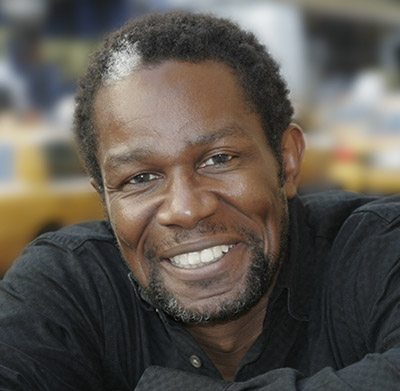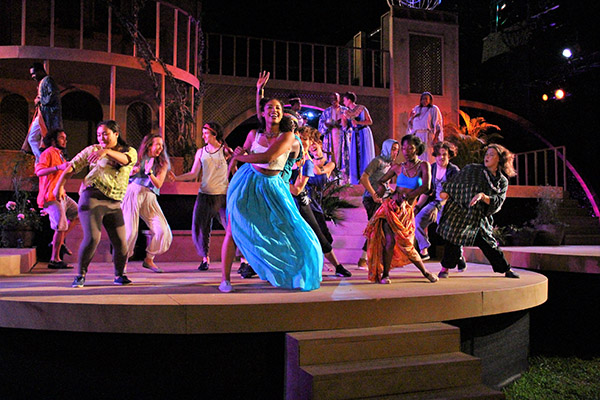Shakespeare’s Summer of Enlightenment
As we step outside our front doors with some semblance of confidence, and the ache in our upper arm now long subsided, where do we go? What do we do now that we can breathe each other’s air again? Who are we now? And where do we take all these questions? To the man with the answers—William Shakespeare. Yes, Shakespeare. New Englanders are blessed this summer with performances and festivals all across the region—as if theater companies and directors knew that this was the moment, this strange, mid-almost-post-pandemic moment, to make the Bard accessible to as many people as possible.

In celebration of its 25th anniversary, Commonwealth Shakespeare Company (CSC) is presenting The Tempest, a brilliant tragi-comedy, laden with themes of betrayal, revenge, magic and, ultimately, the transformational power of forgiveness. Scheduled for last summer, the play is far more relevant today. Now, it’s as if The Tempest were written yesterday, as a bridge from 2020 to 2021; as a cool compress against the pain and tension facing the nation; as a hopeful primer for moving forward.

“The things that made me want to do it [in 2020] are actually more urgent now because I think it’s a play about civil strife, brother against brother and healing the wounds that have been laid bare…and the journey to forgiveness,” says Steven Maler, CSC’s founding artistic director and director of this production. “That notion of healing, of coming together, re-knitting society back together—not just because of the pandemic. We’ve seen in so many different ways how our country is fractured, especially along racial lines and the terrible inequities we’re confronting. How are we going to heal them? How are we going to talk to each other as human beings again? The core themes of the play are even more important now.”
As any actor, student, or scholar of Shakespeare knows, the Bard possessed a gift of clairvoyance, and an otherworldly ability to psychoanalyze and intuit life experiences. If there was ever a time where we needed Shakespeare’s superhero power to ground us in our humanity, it’s now. Not that we need reminding of what we’ve been through, it’s that we need to be reminded to never forget. “Shakespeare meets you where you are,” says John Douglas Thompson, stepping into the lead role of Prospero. “There are so many situations in The Tempest that will resonate to our contemporary life right now…with all the writers that I’ve worked with, it is only through Shakespeare that I could get to these multiple levels of resonance for myself and people who are listening.”
And we are all listening; and craving a cathartic experience that only live theater offers. “Humans breathing together, heartbeats in sync,” adds Maler. “This project will be a rediscovery of my love for this art form. I do think of this as joyful, as a healing process of joy. Not a joy that ignores the pain that’s behind us…it’s a joy that we’re through.” Thompson adds, “It’s unique, that form of poetry that Shakespeare has, in the combination of words, and the ideas they represent. We may not speak the same language now when we try to communicate those ideas of love or anger or frustration or joy but nonetheless are understood when they are actually played.”
Returning to Boston, to New England, is a homecoming for the New York-based actor. Thompson spent many years performing in Boston, the Berkshires and Providence, RI. “I’m anxious to get back to doing theater, just the tactile thing of hand on page, hand on book, people in a room together, debating these large great ideas, excavating, doing all this deep work. I guess I never, in my imagination, saw Prospero or this play through the lens of what we’ve all been through. But I have such inherent faith in Shakespeare that he always meets the culture right, which is what makes his play so profound and timeless, it’s what makes him universal. So pertinent and so specific. So I don’t have anything prescribed in my mind as to what I’ve learned over this time that I will bring to The Tempest. I believe all of that exists inside me as just feeling, emotion, experience and will assert itself because Shakespeare will give me an opportunity to do so without me bending the language, the ideas, or the themes.”

the New York Times “as one of the most compelling classical stage actors of his generation” and in The New Yorker, Thompson
[is] “regarded by some people as the best classical actor in America.”
The parallels between The Tempest and today are striking. Prospero has taken himself and his daughter into a self-imposed exile on an island and causes a storm that shipwrecks others in his life, family and friends, washing them up on his shores to seek justice and revenge. Prospero “is like a regular citizen who decided to take himself into quarantine and now is going to birth himself back in the world, which is something that we’re all going through, this new transition of how do I reconnect myself?,” says Thompson. “Well, come see a play. Sure, that’ll do it but in a bigger sense, it’s like, it’s a universal theme that’s happening for everybody…. There’s something in the message, particularly of Shakespeare, that speaks to the universality of fragility and the universality of we’re all here and we’re trying to move in the right direction and we need help…. The idea that Shakespeare is working with is that we are all so fragile so we cannot judge each other because we don’t know what we’ve individually been through. This level of tension, whether it be racial, sexual, whether it’s based on gender, we must try to find a way to loosen that knot. None of us is better than the other.”
Imagine. Gathering together, safely spaced, on the Boston Common, opening our eyes and ears and being present. United in the words that are being spoken for our enjoyment, our enlightenment. Perhaps this is what Shakespeare intended when he began writing The Tempest in 1610. Knowing that hundreds of years later his words would, as Thompson says, “create resolutions and a future to move into…to get off the shipwrecked island and get back to our lives yet in a new and better way. The play is a great metaphor for where we are.”
In New Haven, CT, Elm Shakespeare is impacting a much younger audience, beginning at age seven. “Kids need to be able to read and tie their shoes,” laughs founding artistic director Rebecca Goodheart. Choosing to forego their annual professional production this summer, Elm is focusing instead on its first Elm Shakespeare Youth Festival in August and the impact on these young actors is life-changing. It’s proven that a child’s brain will grasp a foreign language more quickly than an adult’s and so is it with the language of Shakespeare. “In my experience,” shares Goodheart, “the players [the kids] come alive in ways that we work 10 years to teach adult actors to do. The kids go ‘Oh, yeah, I know what this is about.’” Yet why is that? Shakespeare unlocks self-awareness and self-empowerment. “What we know is that Shakespeare’s language in the bodies, hearts, minds and mouths of youth and kids changes not only the child but the world around him. We’re not interested in what Juliet is supposed to think and feel. But I am infinitely fascinated by what a young person, the young actor, is thinking and feeling when they say, ‘My bounty is as boundless as the sea, my love is deep the more I give to thee. The more I have for both are infinite.’ That does something right there to say, ‘Stand and unfold yourself.’ The language of Shakespeare has an ambiguity within it that allows it to transcend its historical and cultural foundations and open, not only open but demand, that who is speaking it open to a larger experience of themselves, of what it means to be human. And what I must do in the world.”

“Our children are dying and killing each other to be heard,” Goodheart continues. “And Shakespeare gives them a voice because…it’s an accepted form of communication. They could be doing the same thing with rap, but they don’t get the credit for that. So when they stand on stage and say ‘Seek not to alter me, I am what I am’ they have the experience of their community seeing them and hearing them. It changes how they are in the world.”
And what adults must do for the world is keep this channel open, keep theater companies like Elm and CSC funded so that everyone has access. “That’s why our mission is bringing people together through Shakespeare,” says Goodheart. “It’s not to do the best Shakespeare in the world, though I think what we do is really good. The great secret, the wonderful secret is that when you focus on that [empowering younger people], really great theater happens, too.”
“What’s past is prologue,” Antonio says in The Tempest. This new beginning is ours to stage.
For a list of Shakespeare performances and festivals happening across the region this summer, visit artnewengland.com.
Commonwealth Shakespeare Company
Free Shakespeare on the Common
The Tempest, July 21–August 8, 2021
Directed by Steven Maler
commshakes.org
Elm Shakespeare Youth Festival
New Haven, CT
August 13–15, 2021
elmshakespeare.org
